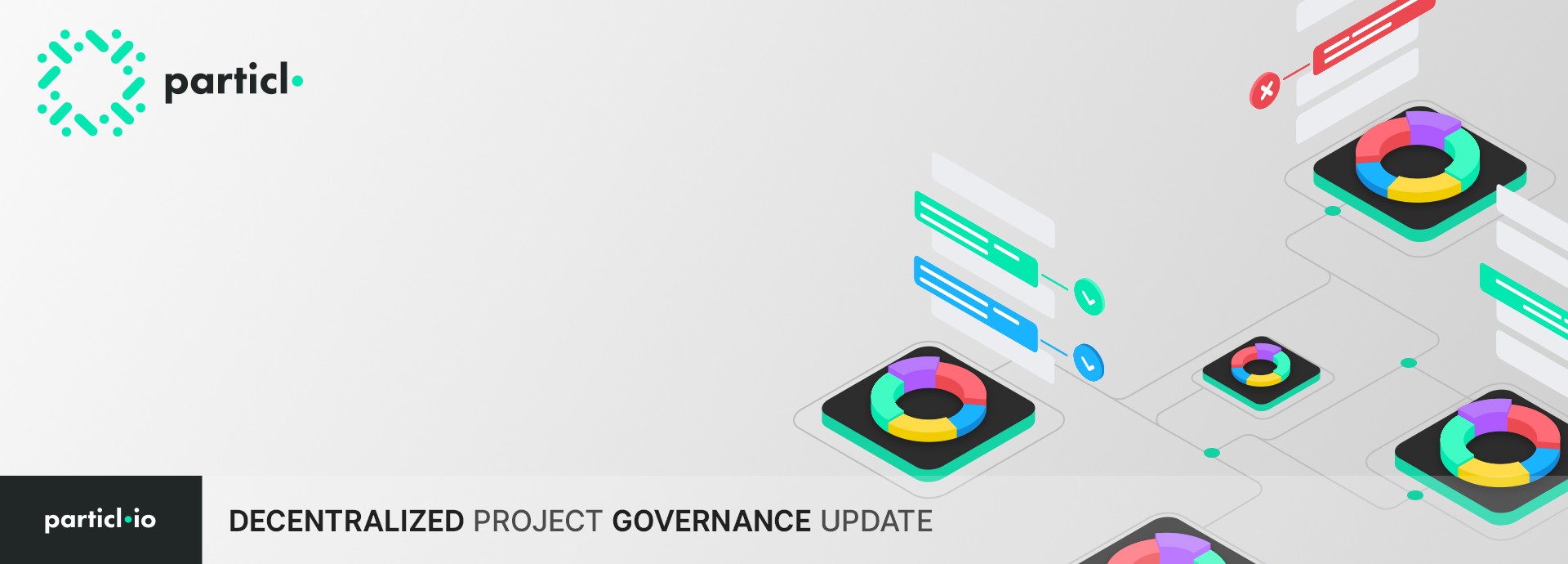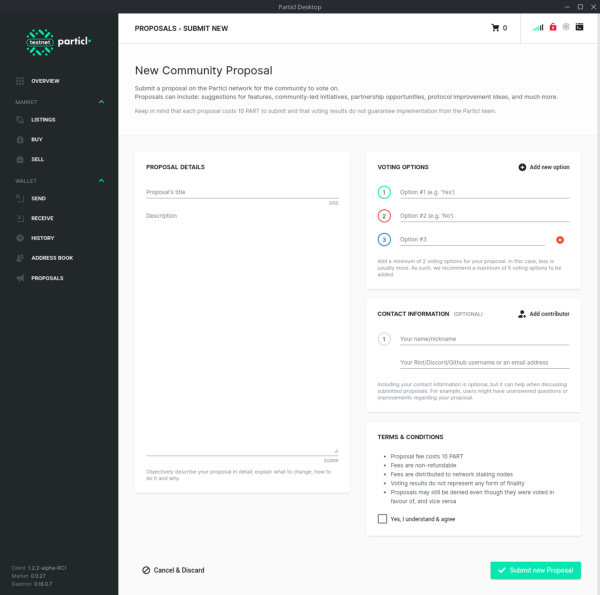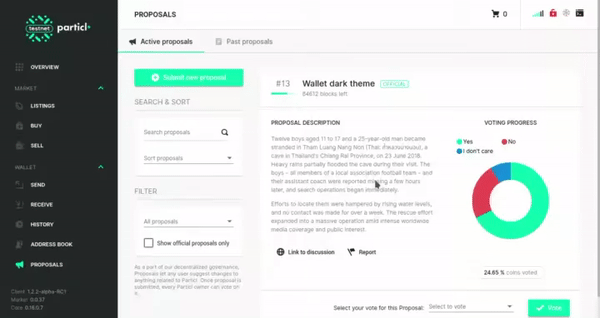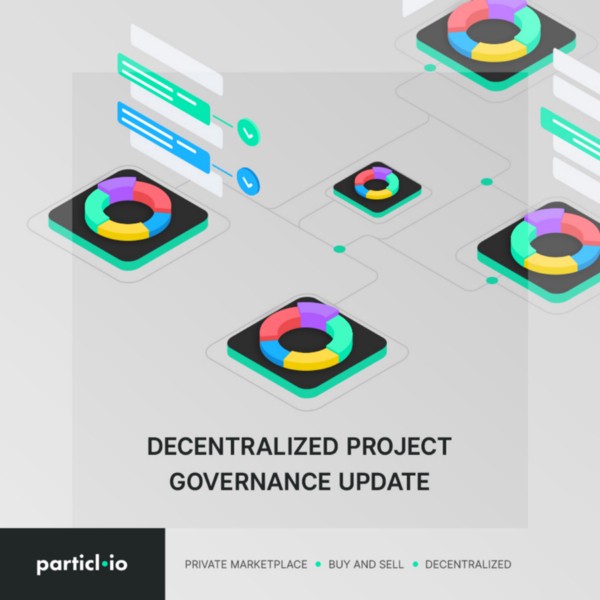
As we’ve highlighted in our third Community Update, the Particl team has begun working on the initial version of the project governance mechanism. Simply put, this mechanism allows anyone to be able to vote or submit up for a vote a formal proposal to the Particl community.
Note: The initial version of the governance system will not contain all the features and functionalities that are planned for later versions (i.e. voting weight). It will, however, be its first “working version” and will contain most (or all) of the basic functionalities. The governance mechanisms will, of course, be a moving target for some time as we experiment with it in real-life scenarios.
How Does it Work?

As many of you already know, Particl has had a fully decentralized voting system on our mainnet ever since it launched in July 2017. This feature, however, has always only been available on CLI (non-graphical Particl wallet) and is relatively restrictive in nature. For example, using the “legacy” voting system of Particl, it was not possible to vote on two proposals at the same time. This behavior not being the most scalable for a truly useful decentralized governance system, the team has been actively working on improving this voting mechanism to give it more flexibility and accessibility.
The first improvement was to implement it into Particl Desktop, the main wallet for the Particl network. Because Particl-cli isn’t really used by most people outside of staking — and more importantly, because users are more likely to use a simple, well-designed interface to provide them a voice on the network — it was really important to port this feature over our main client.

Once implemented, it will be possible to go through the entire proposal process directly from Particl Desktop. Indeed, users will be able to both create a proposal from scratch and submit it to the community for a voting round. Any Particl user will then be able to navigate to their voting screen and vote on any ongoing proposal. To vote, users do not need to be staking anymore, and weight will ultimately be based on coin weight rather than staking weight. This decision has been made in order to increase the governance tool’s accessibility and speed at which consensuses can be reached.
In fact, users that own fewer amounts of coins are less likely to put up their coins for staking, yet they ideally still need to have a way to express their voice so that the governance system can truly be considered democratic and decentralized. There are many other reasons users would not want to put their coins up for staking, yet when the project governance tool releases on mainnet, they will still be able to partake in the project’s decentralized governance process they have a stake in.
Tallying the number of coins instead of the staking weights is also a much more accurate and quick measurement. Indeed, Proof-of-Stake relies partly on luck, similarly to PoW mining, which is democratically not ideal for obvious reasons; accurate results are more interesting than results partly defined by luck. This new governance system mostly requires users to sign a message proving they own the number of coins that they do and that they are voting from their outputs. Don’t worry, this all happens automatically under the hood while the entire governance process is displayed in a user-friendly fashion on Particl Desktop. Tallying coins instead of staking weights also allows the mechanism to find consensuses more rapidly in certain situations, a feat that is definitely useful as that same mechanism is also the basis for the marketplace governance system where undesirable content needs to be taken out as quickly as possible.
Votes are tallied every time a user votes, which means that as you move your coins around, so do your votes as well. It is thus possible to easily change your vote if you move your coins before a voting round completes.
Cold Voting
The project governance mechanism is also built with hardware compatibility in mind. In fact, as stated in yesterday’s announcement of the integration of Particl on the Ledger Nano S, users will eventually be able to “cold vote” using their Ledger Nano S hardware device directly from the Particl Desktop client. This is probably not a feature that will be available out of the box once the project governance system hits mainnet as it still requires a bit of work on our end, but it will ultimately be available at some point in the future. This is directly related to our commitment to develop and make available the most secure blockchain solutions in the industry. To understand the significance of cold voting vs regular, especially as it relates to security, read our Hardware Cold Staking announcement here.
Community Initiative Fund

Back when Particl users were asked to generate their keys and prepare for the Particl genesis block, an initiative has been proposed by the community to compensate SDC coin holders who had failed to swap their coins within the given swap timeframe. As such, the community donated an impressive amount of over 156,000 PART to be paid to the late swappers. Since the clemency period was set up to last up until the last day of 2017, it wasn’t possible at the time to know how many late swappers would claim their PART coins, thus making the donation target a blind one. For this reason, Particl users ended up donating an excess amount of coins to the Community Initiative Fund. This address contains, without any late swapping claims being accepted anymore, a final total amount of 33,817.64 PART.
The Community in Control
The Community Initiative Fund is a donation address owned by the Particl community itself. In fact, since its funds originate from community donations, neither the Particl Foundation nor the Particl team can move them around without any form of community consensus first.
To facilitate debates around proposed solutions, ideas, and proposals made on how to best use these funds, we’ve announced and created back in January a Kialo discussion thread. Kialo is a good debate platform where users can form arguments and counter-arguments in a structured and easy-to-follow fashion.

As we are nearing the testnet and mainnet implementations of the project governance system on Particl Desktop, there has never been a better time to put down on paper and on Kialo any proposal idea you have been thinking about. The best way to get your proposal accepted by the community is to create excitement leading up to the voting round, therefore initiating discussions around your project early on could end up helping your proposal being voted in favor of. If you submit any idea on Kialo, make sure to post about it on our Discord server or in the coming Particl forum so that people can know and discuss it.
As the decentralized project governance system still requires a bit of work and of course, testing, there is still some time left to prepare your proposals until we hold official voting rounds related to the Community Initiative Fund. More details about these rounds will be included in a next Decentralized Project Governance Update.
Don’t forget that you can track most of the development process by following us on Github. Make sure to also join our Discord community and #BePART of the fight for privacy!
The Particl Team